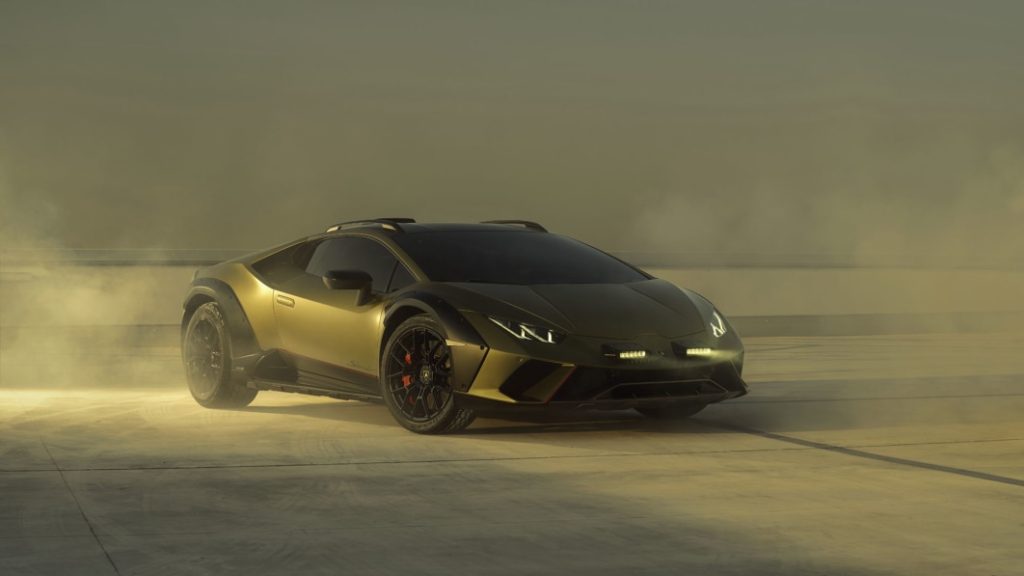Lamborghini Huracán Sterrato off-roader is a heavy-metal swan song

Lamborghini’s Huracán has almost reached retirement age, and it’s going out with one hell of a bang. The model’s last evolution may be the wildest yet: called Sterrato, it’s an off-roading supercar with a rugged-looking design, a big V10, and a desert-ready suspension system.
If the design looks familiar, it’s likely because Lamborghini previewed the Sterrato by unveiling a close-to-production concept in June 2019. Some of the finer design details have evolved over the past three years, but the basic idea hasn’t: The Sterrato remains recognizable as a member of the Huracán range, but it’s characterized by styling cues you’d expect to find on an off-roader such as flared wheel arches, an additional pair of lights on the front end (they will be covered on American-spec cars because they can’t be homologated), and roof rails. The coupe sits higher than the regular Huracán and rides on 19-inch wheels. Check out the roof-mounted scoop; it’s not there for show.
“In the STO, the scoop is functional but it’s there to help with cooling; the air intakes are on the sides [of the car]. In this car, the air scoop is the air intake, and we have completely revised the intake system because during testing we realized that if you drive very fast off-road, with a lot of direction changes, for a long time then dust blocks the air filters too fast. We decided to close the side entries and added the air scoop to catch the cleanest possible air, and we optimized the air filter itself. This is the reason why the Sterrato has “only” 610 horsepower. It’s the same engine as the STO, complete with titanium valves, but the reduction of power is due to the fact that the redesigned air intake system has a bigger air pressure drop,” Rouven Mohr, the head of Lamborghini’s research and development department, told Autoblog.
Speaking of the engine, power for the Sterrato comes from a naturally-aspirated, 5.2-liter V10 tuned to develop 610 horsepower at 8,000 rpm and 417 pound-feet of torque at 6,500 rpm. Mid-mounted, it spins the four wheels via a seven-speed dual-clutch automatic transmission and a mechanical locking rear differential. Lamborghini quotes a 0-to-62 mph time of 3.4 seconds and a 162-mph top speed. For context, the aforementioned STO takes 3 seconds flat to reach 62 mph and tops out at 193 mph — it can’t go very far off the pavement, though.
Building a Huracán capable of sprinting across the desert required making significant changes to the suspension system.
“From a geometric point of view, we increased the ride height by 44 millimeters, the front track by 30 millimeters, and the rear track by 34 millimeters. We also increased the front and rear wheel travel by 25% and 35%, respectively, to ensure that even if you drive at high speeds the wheels follow the surface. From the hardware perspective, we reduced the spring stiffness to allow for more rolling and pitching, reduced the damper forces, and recalibrated all of the systems including the traction control and ABS systems,” Mohr told Autoblog.
Lamborghini also added a driving mode called Rally, which joins the familiar Strada and Sport profiles. Six-piston front brake calipers that grip ventilated and cross-drilled carbon-ceramic rotors promise to help drivers make the most of the V10’s power on and off the tarmac.
Even the cabin isn’t exactly standard Huracán fare. The infotainment system’s touchscreen features redesigned graphics, and it can be configured to display an inclinometer, a compass, as well as a geographic coordinate indicator, among other data points. Like the regular, road-only Huracán, the Sterrato offers Amazon Alexa connectivity and is compatible with the Lamborghini Unica smartphone application.
Lamborghini will build precisely 1,063 units of the Huracán Sterrato, and production is scheduled to begin in February 2023 in Sant’Agata Bolognese, Italy. Pricing hasn’t been announced yet, but we’re betting the full production run will be quickly spoken for. If you want one, act fast and don’t wait for a convertible to come out: Mohr confirmed to Autoblog that the Sterrato will be exclusively available as a coupe.



